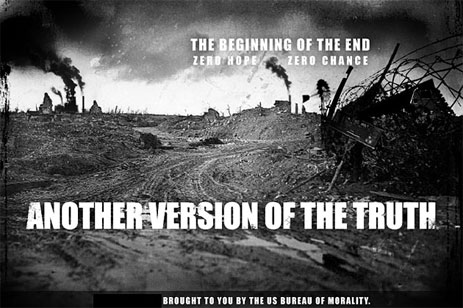
By Jason Apuzzo. Nine Inch Nails’ Trent Reznor, HBO and the BBC are apparently in the early stages of developing a sci-fi dystopian series based on Reznor’s album/alternate reality game, Year Zero. Here is the LA Times article on all this, and here is an extensive interview with Reznor about the Year Zero project.
According to the LA Times, the Year Zero project has its origins in Reznor’s rage over “the geopolitical situation during the Bush years.” I personally haven’t heard Reznor’s album – because I find him loathsome, and always have – nor played the game.
Wikipedia describes the basic premise of the Year Zero video game in this way:
The story takes place in the United States in the year 2022, which has been termed “Year 0”, by the American government, being the year that America was reborn. The U.S. had suffered several major terrorist attacks, apparently by Islamic fundamentalists, including attacks on Los Angeles and Seattle. In response, the government granted itself emergency powers and seized absolute control on the country. The U.S. government is now a Christian fundamentalist theocracy, maintaining control of the populace through institutions like the Bureau of Morality and the First Evangelical Church of Plano. Americans must get licenses to marry, bear children, etc. Subversive activities can result in these licenses being revoked. Dissenters regularly disappear from their homes in the night, and are detained in federal detainment centers and sanitariums, if not executed.
The government corporation Cedocore distributes the drug Parepin through the water supply, making Americans who drink the water apathetic and carefree. There are several underground rebel groups, mainly operating online, most notably Art is Resistance and Solutions Backwards Initiative. The First Evangelical Church of Plano is a fundamentalist Protestant Christian church which is favored by the neo-conservative government.
Sounds charming – alternate reality, indeed. The Wachowskis must really be bummed that Reznor got a network to back this stuff, while they still have to slog it out in the indie scene .
By the way, I’m still waiting for my old friend Patrick Goldstein to get back to me about the whole ‘liberal filmmakers checking their politics at the door’ thing.
Posted on September 28th, 2010 at 2:26pm.








